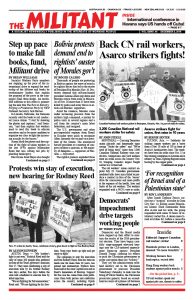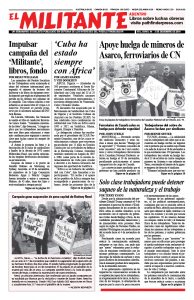Thousands of people are protesting in Bolivia against the wave of attacks by rightist forces that led to the ouster of President Evo Morales Nov. 10. Protesters demand that self-proclaimed president Jeanine Áñez step down and Morales return from exile in Mexico. As of Nov. 20 more than 25 have been killed by police and army forces in attacks on Morales’ supporters.
Amid the violence, Morales came under increasing pressure from the military high command, a mutiny by police units in several regions and a call from the country’s main labor federation, and resigned.
The U.S. government and other pro-imperialist regimes from Brazil to Ecuador were quick to recognize Áñez, formerly the second vice president of the Senate. She announced herself president at a meeting of congress without a quorum, as the majority of delegates — supporters of Morales — boycotted.
The rightist protests exploded three weeks earlier following Morales’ disputed victory for a fourth term in the Oct. 20 presidential election. After losing a February 2016 referendum to amend the constitution to allow him to run again, Morales got a court to overturn the prohibition.
Morales, Bolivia’s first indigenous president, came to office in 2006 with 54 percent of the popular vote, following massive protests that he helped lead, vowing to reverse centuries of exploitation and discrimination against the nation’s majority Quechua and Aymara indigenous population.
Under his tenure Morales and his party, the Movement Towards Socialism, initiated government welfare and infrastructure programs that improved conditions for the poorest sections of the working class and small farmers, won passage of a new constitution that made Bolivia a secular state with no official religion, and codified indigenous rights.
He developed fraternal relations with Cuba’s revolutionary leadership and invited over 700 Cuban internationalist health care workers to provide treatment in the most isolated areas of Bolivia.
At the same time, Morales’ promoted agreements with foreign and domestic capitalists to exploit the country’s hydrocarbon, mining and agricultural resources, at times over the objection of his own supporters who saw this as a violation of the rights of indigenous communities. But foreign and domestic capitalists alike never ceased seeing in the Morales government and the aspirations of the popular forces that supported him a threat to their economic and political interests.
Following the contested presidential election, Bolivia’s far right, led by wealthy businessman Luis Fernando Camacho, whipped up accusations of fraud and calls to annul it. The pro-Washington Organization of American States — which Morales had invited to review the elections — said the vote was marked by widespread irregularities.
Violent attacks by rightists
Camacho’s supporters launched violent attacks against Morales’ supporters and members of his government. Patricia Arce, mayor of Vinto, from Morales’s party was attacked by right-wing thugs who set fire to the local government office, then cut her hair and paraded her through town covered in red paint.
While claiming her “only objective” is to hold new elections as soon as possible, Áñez — often flanked by Camacho — wasted no time in attacking the rights of working people and indigenous communities. She replaced the top military brass, cabinet ministers and the heads of state-owned companies. She granted immunity to police and army from prosecution. Within hours, cops and soldiers attacked Morales’ supporters trying to enter Cochabamba, leaving nine dead.
“During 13 years we have lived under what they are calling a dictatorship,” said Aymara indigenous leader Gonzalo Quenallata, yet “in full democracy, in less than a week there has been more than 25 killed” by the new government.
Moves against Cuba, Venezuela
Áñez immediately joined U.S. imperialism’s ongoing drive to isolate the governments of Cuba and Venezuela. She recognized pro-imperialist opposition leader Juan Guaidó as Venezuelan president and expelled Venezuela’s diplomats from Bolivia. Her new foreign minister announced Bolivia will leave the Bolivarian Alliance for the Peoples of Our America (ALBA). The alliance is a Latin America and Caribbean alternative to trade pacts and political bodies dominated by Washington that is led by Cuba and Venezuela.
Right-wing forces in Bolivia were emboldened by the defeat in recent years of a number of governments that had friendly relations with Cuba, including in Brazil, Ecuador, Paraguay and El Salvador. And by Washington’s moves to step up its economic war against Cuba and attacks on the Nicolás Maduro government in Venezuela.
In a serious provocation Nov. 13 in El Alto, outside La Paz, the Áñez regime arrested four members of Cuba’s medical brigade. Echoing Washington’s most extreme anti-Cuba rhetoric, Áñez slandered the internationalist volunteers, calling them “so-called” doctors and falsely accusing them of fomenting the protests against her.
Given the threats, the Cuban government decided to withdraw the volunteer brigade. “We stayed at our posts, supporting the health of our sister Bolivian people until the last possible moment,” surgeon Nirza García Valdés told Granma upon her return to Cuba. “No regime, no coup, can erase the results of what we have accomplished.”
The indignation provoked by Áñez’s power grab sparked broad protests, including by many who have criticized aspects of Morales’ policies and actions. Protesters have set up blockades on major highways leading to La Paz. Unable to bring in food or gas by land, the new regime has been flying in supplies.

